The opposition coalition “Amizero y’Abarundi” filed on Thursday 24 May 2018, a complaint to the Constitutional Court against serious irregularities occurred in the referendum and requested the court to invalidate the results.
After the political battle, the clash erupts on the legal ground. The coalition wants to exhaust all remedies.
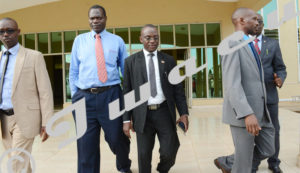
The majority of the population voted yes in the referendum
“Amizero y’Abarundi” Leader, Agathon Rwasa describes the referendum results,” fanciful”. According to him, that election lacks transparency, and was held in climate of fear and intimidation. That is the reason why he wants to invalidate some results.
The coalition had three days after the announcement of the provisional results by the Independent National Electoral Commission (CENI) to lodge a file to the Constitutional Court. This one has eight days to check whether or not the process is regular.
The Constitutional Court has the heavy responsibility to rule on the validity or invalidity of the referendum. Then, the President of the Republic will be able to promulgate this Constitution after the announcement of the final results.
Things are complicated when this new Constitution is enforced. For this case, the provisions contained in this law contradict each other. Article 292 states that this Constitution comes into force on the day of its promulgation. This suggests that the old Constitution will be suspended.
Except that Article 288 provides that, the institutions in place remain in office until the effective installation of new elected institutions while waiting for the establishment of the institutions resulted from the elections.
Hence the ambiguity arises especially on the future reserved for the ministers from the “Amizero y’Abarundi” coalition. The question is whether the President of the Republic will keep them in his government or take advantage of the new situation that does not set any obligation. This is contrary to the 2005 Constitution, which established the obligation of the majority party to share power with all parties or coalitions of independents who obtained 5% in the legislative elections.
Who loses and who wins?
The 2020 elections are approaching fast and it is difficult to know what will really happen to the opposition coalition of Amizero y’Abarundi, the ruling party’s challenge. Article 86 of the new Constitution stipulates that no coalition of Independent actors can be authorized.
However, it leaves a gap through the article 99 which stipulates that in matters of presidential election, candidates may be presented by political parties or political parties’ coalition or stand as independents.
The big change that concerns many observers is the “reset” of the counter of President Nkurunziza’s terms. With this new situation, he has the opportunity to run for two more terms from a five-year term to the seven-year one.
Reactions
First Deputy President: “respect for the verdict of the polls”
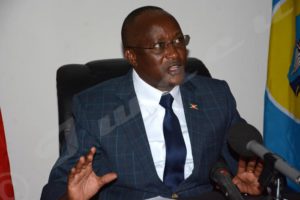 For Gaston Sindimwo, those who feel aggrieved can file their complaints to the authorized institutions. For him, it is therefore a good thing that the coalition lodge complaints to the Institutional Court. The first vice-president demands that the verdict of the poll be respected when the final results are announced. “That is democracy, we must respect the people’s choice”
For Gaston Sindimwo, those who feel aggrieved can file their complaints to the authorized institutions. For him, it is therefore a good thing that the coalition lodge complaints to the Institutional Court. The first vice-president demands that the verdict of the poll be respected when the final results are announced. “That is democracy, we must respect the people’s choice”
CNARED: Negotiations by will or by force
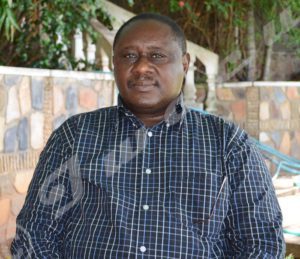 Jean Minani, Chairman of the opposition platform in exile considers that Burundi does not have a new Constitution. “The referendum holdup does not change anything,” says CNARED chairman. Minani said that CNARED’s struggle to claim the restoration of the agreement, this Constitution and the rule of law will be intensified adding that “President Nkurunziza will be present at the negotiating table willingly or forcibly, it is only a matter of time”
Jean Minani, Chairman of the opposition platform in exile considers that Burundi does not have a new Constitution. “The referendum holdup does not change anything,” says CNARED chairman. Minani said that CNARED’s struggle to claim the restoration of the agreement, this Constitution and the rule of law will be intensified adding that “President Nkurunziza will be present at the negotiating table willingly or forcibly, it is only a matter of time”
France: “Inclusive dialogue, priority”
 France takes note of the results of the referendum. If they claim that the referendum was held peacefully, it regrets that the campaign took place in a climate of violence against the opposition. “This reform will not help to solve the crisis in which the country has been plunged since 2015.” For France, the priority is to engage in an inclusive dialogue.
France takes note of the results of the referendum. If they claim that the referendum was held peacefully, it regrets that the campaign took place in a climate of violence against the opposition. “This reform will not help to solve the crisis in which the country has been plunged since 2015.” For France, the priority is to engage in an inclusive dialogue.
African Parliamentary Union: “Disinformation campaign”
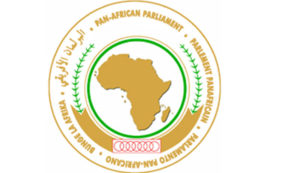 The executive committee of the African Parliamentary meeting at its 72nd session in Bujumbura congratulates Burundi on the successful organization of the referendum. It regrets the poor appreciation of the political, social and security situation following what it describes as a misinformation campaign. “The situation has improved. For this committee, maintaining the sanctions of the European Union puts Burundian people in an unfair situation.
The executive committee of the African Parliamentary meeting at its 72nd session in Bujumbura congratulates Burundi on the successful organization of the referendum. It regrets the poor appreciation of the political, social and security situation following what it describes as a misinformation campaign. “The situation has improved. For this committee, maintaining the sanctions of the European Union puts Burundian people in an unfair situation.
Analysis by Agnès Ndirubusa
The victory of no
Let’s say, the referendum vote was done in a relatively calm climate. Burundians massively participated in the referendum. Doubts about possible ballot stuffing and falsification rise at the counting. At some polling stations, the absence of the opposition observers strengthens the count of the yes, according to the opposition. “It is even thought that several votes of no have gone to swell up the percentage of void votes,” say some opponents. In short, it is now up to the Constitutional Court to rule impartially.
In any case, no politicians could blush, considering the referendum result and given the circumstances. Some opposition supporters say in humor that the “no” has won. After the failed coup, various reports reveal the lock of the political space. In this context, that the “No” is credited with 19. 34%, it is not such a bad score finally, compared with the 2005 referendum, where it had only represented 7. 58%. The score has tripled.
Meanwhile, the 2020 elections are approaching fast and the recent referendum could serve as a mirror. CENI could therefore anticipate the different hiccups encountered and already consider possible solutions. Political parties should also adjust or rectify their strategies.
Meanwhile, the image of Burundi is a little more damaged by a Constitution that the international community considers discriminatory against opponents and minorities. A diplomat, under anonymity, thinks there is a risk of a hardening of the western countries’ attitude. In economic terms, the fall of the Burundian currency continues and Burundians are victims of the situation.
Constitutional Referendum
CENI: “17 May Experience confirms what is possible”
The CENI Chairman announced on 21 May, the provisional results of the 17 May constitutional referendum. The “Amizero y’Abarundi” coalition denounces the irregularities and made an appeal.
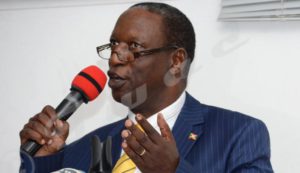
Pierre Claver Ndayicariye: “The 17 May experience is a strong expression of a political will, the manifestation of a considered choice and the confirmation of what is possible.”
The “yes” vote won at 73.26% against 19. 34% of the vote “No” while the void is estimated at 4.11%, and the abstentions at 3.28%. These are provisional results proclaimed on 21 May by Pierre Claver Ndayicariye, Chairman of the Independent National Electoral Commission (CENI). For him, the voters were 4,768,142, with 3828 polling centers divided into 11076 voting offices including 11031 located throughout the country and 45 in Diaspora. The participation rate is estimated at 96.24%.
In addition, he indicated that 242,281 are voters registered, but whose voting cards have been kept to the electoral commission because they are not yet aged 18 to be allowed to vote. 12927 are voters in Diaspora.
The announcement of the results shows that Karusi and Kirundo provinces are leading with more than 83% in favor of the “yes” while Bururi province and the capital Bujumbura are ranked the last and record respectively 52. 13% and 53.10% for the “yes”.
The CENI Chairman reported that the results of some embassies and consulates are not yet available including those from the United Kingdom, Canada and Ethiopia.
He, however, says the results of the Diaspora cannot influence the results from the countryside. “They represent 0.27% of registered voters”, he says.
The results available from Diaspora reveal that “yes” won against «no” except in Rwanda where the “no” won with 66.61%.
Ministers, MPs, diplomats and consular missions accredited to Burundi, representatives of political parties, members of “Amizero y’Abarundi” coalition, civil society organizations and religious denominations were present during the publication of the referendum results.
Electoral Commission congratulates Burundi government and the media
Pierre Claver Ndayicariye, Chairman of the Independent National Electoral Commission pays tribute to the Burundian government which took full charge of the referendum budget. “The experience of May 17 is the strong expression of a political will, manifestation of a careful choice and the confirmation of what is possible,” says Ndayicariye.
He also says the media covered the referendum campaign in a balanced way. “The media experience is to be strengthened for the next elections,” he says.
Ndayicariye announces that the electoral commission will transmit without delay the results of the referendum to the Constitutional Court under Article 77 of the Electoral Code. “The official publication of the results by the Constitutional Court must be done no later than the 9th calendar day from the day of their transmission, «he says.
Reactions
“Fanciful results”
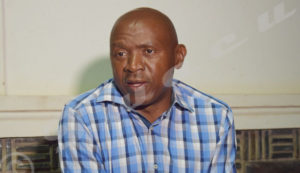 Agathon Rwasa, Chairman of the Coalition of Independents “Amizero y’Abarundi” doesn’t hide his disappointment: “The process took place in the most abject conditions. There was a lack of independence and transparency. Some of our political supervisors were expelled or prevented from entering the polling stations”, he says.
Agathon Rwasa, Chairman of the Coalition of Independents “Amizero y’Abarundi” doesn’t hide his disappointment: “The process took place in the most abject conditions. There was a lack of independence and transparency. Some of our political supervisors were expelled or prevented from entering the polling stations”, he says.
He also says serious irregularities have been found in Gatete and Mutambara localities of Rumonge province and Bushaza area in Kirundo Province. “In short, the results are fanciful,” he says.
Rwasa says he plans to file complaints to the Constitutional Court to enforce the law. When asked to say impartially about the law, Agathon Rwasa replied that “it is a test for this court. The results will prove it to us. ”
“The political struggle continues”
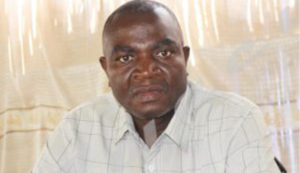 “There was no surprise,” says Phenias Nigaba, Spokesperson for Sahwanya FRODEDU party. The reasons are multiple. First, he explains that the document was kept secret. Then the referendum was marked by violence and intimidation of opposition activists. Finally, the regional and international community did not send observers. “It’s a non-credible process. A decline of democracy,” he says.
“There was no surprise,” says Phenias Nigaba, Spokesperson for Sahwanya FRODEDU party. The reasons are multiple. First, he explains that the document was kept secret. Then the referendum was marked by violence and intimidation of opposition activists. Finally, the regional and international community did not send observers. “It’s a non-credible process. A decline of democracy,” he says.
On the other hand, he says, it’s a successful mission for FRODEBU party. For him, the “no” campaign has shown that there are people who are totally against a project that buries the Arusha Agreement.
Nigaba is determined and optimistic: “Our political fight will continue for Arusha Peace Agreement respect.” This politician explains that his party will rely on the people. “The latter hold the key to power.”
“A victory of the Burundian people”
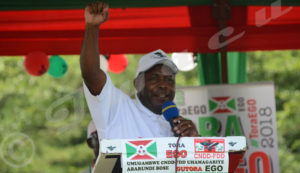 Evariste Ndayishimiye, Secretary General of the ruling party- CNDD-FDD, is satisfied with the smooth running of the referendum. For him, the results of the referendum do not reflect the victory of the “yes” on the “no”, but rather mark a victory for all the Burundian people.
Evariste Ndayishimiye, Secretary General of the ruling party- CNDD-FDD, is satisfied with the smooth running of the referendum. For him, the results of the referendum do not reflect the victory of the “yes” on the “no”, but rather mark a victory for all the Burundian people.
This is a step, he adds, which marks a decisive turning point where Burundians have just chosen their own path for a brighter future.
He also salutes the determination of the supporters of the “no”. “Burundian people have shown political maturity,” he says.
“A political and democratic maturity of Burundians”
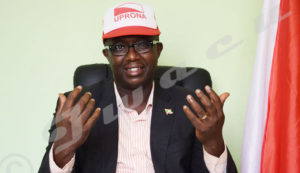 The same satisfaction on the UPRONA side. According to Olivier Nkurunziza, Secretary General of this party, the scores show a certain political and democratic maturity of the Burundian people. “
The same satisfaction on the UPRONA side. According to Olivier Nkurunziza, Secretary General of this party, the scores show a certain political and democratic maturity of the Burundian people. “
He dismissed the irregularities raised by the coalition of “Amizero y’Abarundi”. “They are not likely to taint the regularity of the ballot”. He advises Agathon Rwasa to respect the results of the polls.
Asked about the absence of the international observers, Nkurunziza says their absence cannot question the results of the poll. He says the doors were open to them. “The process belongs primarily to Burundians,” he says.
Written by Agnes Ndirubusa and Félix Habiyakira
and translated by
Diane Uwimana and Lorraine Josiane Manishatse

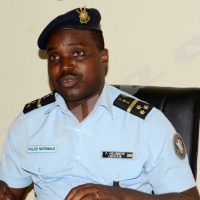
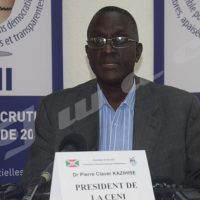
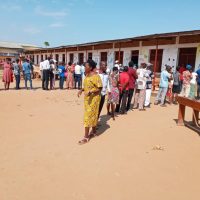
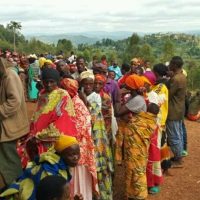
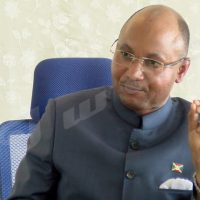













 IWACU Open Data
IWACU Open Data

